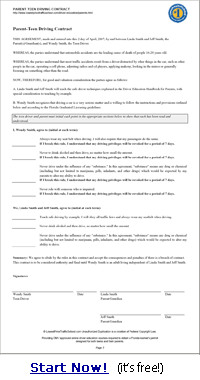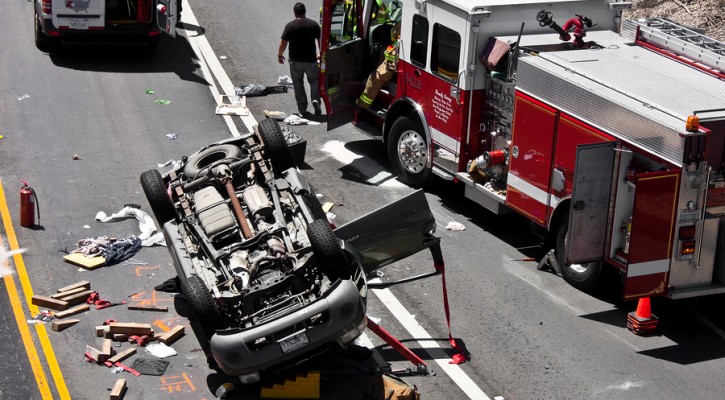Do as I Say, Not as I Do
January 16, 2007
Following those words may be more beneficial than you think, and it may even save your life. A recent study by Liberty Mutual and SADD concluded that about 65% of middle and high school teens will look to their parents as influences when they begin driving. What’s scary is the behavior the parents are unknowingly demonstrating to their teenagers is considered highly risky and factors for fatal car crashes.
Here are a few scary statistics that the report uncovered:
- 62% of high school teens reported that their parents talked on a cell phone while driving
- 48% of teens reported that their parents regularly sped, and
- 31% reported that their parents do not wear a seatbelt
Proof that teenagers do, or will, in fact mirror their parents driving behavior is as follows:
- 62% of high school drivers talk on a cell phone while driving, while about 50% of teens who do not yet drive say they will probably engage in such behavior
- 67% of high school drivers report speeding while driving, though about two-thirds of all teens who do not yet drive say will not speed when getting their licenses, and
- 33% of high school drivers say they don’t wear a seatbelt
What is strange is that a large percentage of teens do not believe these driving practices are risky, and the majority of teen drivers (89%) believe they are safe drivers.
- About 30% of teens believe it is safe to speed
- About 27% of teens believe driving without a seatbelt is safe, and
- About 27% of teens surveyed believe driving while talking on a cell phone is safe
This shows just how much a parent’s influence has over their child. It also is the reason why groups such as Liberty Mutual and SADD repeatedly stress the importance of a parent’s role in keeping their teens safe on the road. Knowing that their behavior is being mirrored may help them change their own driving habits, or at least help them realize they need to be properly educating their teen driver about safety.
A Few Good Teen Driving Resources
January 9, 2007
Studies have shown that parents have a lot of influence over their teens driving decisions, which has put a lot of responsibility back on them for keeping teens safe on the road. Thankfully, there are many resources available to help parents who may need some additional instruction on how properly to coach their new teen driver. Parents themselves often engage in some risky driving behavior, and a recent Liberty Mutual report showed that teen drivers mimic their parent’s behavior. Perhaps parents need to pay close attention to the available safety resources as well.
Liberty Mutual and RADD, or “The Entertainment Industry’s Voice for Road Safety,” formerly known as Recording Artists Actors & Athletes Against Drunk Driving, have teamed up to produce a teen driving safety kit available through Liberty Mutual offices. The package, “The Road Ahead: Stay Safe at the Wheel,” includes a video, family discussion guide, and safe driving pledge.
The video is quite an eye-opener. Candid interviews with teens, and their experiences with risky driving, and its consequences should make all teens realize we are not immune to these types of disasters. However, even the small portion of the video on the Liberty Mutual website showed teens admitting that, despite knowing the risks, they still feel that it won’t happen to them.
Also a part of the video is segments from RADD’s own video, “SMASHED: Toxic Tales of Teens & Alcohol.” The title enough is to scare you into driving straight. A documentary created by HBO Family, “SMASHED” is filmed at the University of Maryland’s Shock Trauma Center, following real case studies of teens in severe auto accidents relating to drugs or alcohol. The documentary follows their progress and makes a very strong statement about the reality of drinking and driving.
“The Road Ahead” by Liberty Mutual can be requested by calling 1-800-4-LIBERTY, and other teen driving resources are available on their website. “SMASHED” is available on RADD’s website, where you can also find valuable information about the entertainment’s industry help in this cause.

New Teen Driving Guidelines Issued by American Academy of Pediatrics
January 2, 2007
Parents, law enforcement officials, and communities nationwide have put their efforts into curbing risky teen driving, and now doctors are showing their determination to end teen fatalities as well. Deaths due to auto accidents are the number one killer of teenagers, and the AAP goes a step further to detail that highway crashes kill about 5,000 16-20 year olds each year, and two-thirds of those are male. About half a million teenagers are injured in such accidents.
Obviously, teenage drivers need some help when it comes to being behind the wheel. Driver education courses and behind-the-wheel training may educate a driver on the do’s and don’ts of the road, but they do not give teens the experience they need to know what they do (and don’t do) to put themselves at risk. This is where parents come in, and the AAP has issued some guidelines for pediatricians to help parents set rules for their teens when they are behind the wheel.
The AAP suggest doctors educate parents and teens about risky behaviors including being distracted by food, cell phones, or other passengers, and encourages doctors to counsel young drivers on the dangers of drinking (or doing drugs) and driving. Parents are encouraged to set rules, as well as monitor the vehicles in which the teen will be riding or driving.
Also, pediatricians support a “safe-ride” agreement between parents and teens. A teen agrees to call their parent for a ride if they (or their driver) are impaired, and the parent agrees to withhold judgment and drive their teen home. The AAP even offers a sample contract that can be tailored for parents and their teens, including conditions under which they will not drive, and consequences that will take place if rules are not followed.
It’s great that doctors have taken the oath to save lives a step further by being proactive in the cause of teen driving safety. Teens cannot be reminded enough how dangerous the road can be, and hopefully hearing it from all of the community will make a difference. If it at least saves one young life, it will be a huge difference.
Nearly Half of All Teen Driving Fatalities Caused by Speeding
December 29, 2006
Have you sped while driving? Sure, who hasn’t, right? Well according to statistics, if you’re a teen driver, you are putting yourself at a high risk for a car accident. And if you’re a parent of a new driver, you should know how your teen defines speeding. One study in California showed that most teenage drivers defined speeding as driving in the area of 90 mph or more. Driving 65 in a 55 zone was not considered speeding by them. That’s a scary thought.
What’s worse is that teenagers do not realize the consequences of speeding. A 2005 study by the Allstate Foundation found that about half of all teenage fatalities resulting from car crashes were caused by speeding. However, all over the nation, teens are being pulled over for excessively speeding for reasons that they believe are important, but they are instead putting lives at risk, including their own.
Recently, an online newspaper reported that a 16-year-old boy was pulled over for driving 142 mph at about 12:40 a.m. Officers believe this is the fastest speed ever recorded on their roads, as most cars don’t even go that fast. The teen’s excuse for speeding? He was late getting home, past his curfew, and afraid his parents would get angry. In the same community a few months prior, a 17-year-old girl was pulled over for driving 101 in a 30 mph zone. Again, it was late night, and she was in a hurry to get home.
What are these drivers thinking? Obviously they don’t realize the true dangers of speeding. They feel invincible. Sadly, many teens who feel this way don’t make it home to their parents, not even late. Wouldn’t it be better to just make it home late, and alive, then not at all? Hopefully teens can realize that speeding is not the answer, and that perhaps open communication with their parents is a good start to driving safety. Next time you’re going to be out past your curfew, call your folks and let them know you’ll be late, and home safe.

Teens Are Not Immune to Death or Injury
December 20, 2006
In Mandeville, Louisiana, law enforcement and school officials alike are trying to spread the word about safe teenage driving. A forum on teen driving, titled “Teen Focus on Safe Driving: The Myth of the Invincible Teen,” was sponsored by the St. Tammany Parish School Board. The purpose of the forum was to show teens that they are not immune to being killed or seriously injured in a car crash, something that has unfortunately been proven lately by local teen drivers.
At the forum, teams gathered to learn from law enforcement officers, and medical and other driver education professionals. Presenters also showed a national award-winning video that warned teen drivers again of the risks they take every time they get behind the wheel. Not only are they putting themselves at risk when getting involved with poor choices and behavior, but they are putting others at risk as well.
Drinking and driving and not wearing seat belts were two of the most common risky behaviors addressed at the forum. An Associate Professor of Emergency Medicine at Louisiana State University, Dr. Todd Thoma, stated that almost 40 percent of auto fatalities are due to drinking and driving. And while new seatbelt laws have saved hundreds of thousands of lives, many more people still do not wear them.
The teams, which comprised of a school administrator, two school teachers or counselors, one parent and more than 10 students, gathered in groups after the presentations to brainstorm ideas on sharing what they learned to the rest of their classmates. Ideas such as staging mock accidents and how they could have been avoided by following the rules of the road and holding safe teen driving pep rallies were mentioned.
This forum showed teenagers that they need to be responsible when driving, and be aware of the safety issues and dangers involved. Teens can’t rely on parents and law enforcement officials alone to keep them safe – we need to remember that we are the ones behind the wheel, making the decisions. Hopefully this forum will have showed enough teens how to make the proper decisions, ones that just may save their lives.
